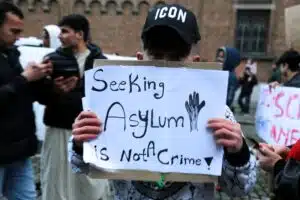Brussels – “For Italy and the Med5 countries this is a very bad deal, the headline should be that ‘Dublin lives on’ with the basic rules of responsibility”. The analysis of the Council general approach on two key-files of the Pact on Migration and Asylum by Catherine Woollard, Director of the European Council on Refugees and Exiles (Ecre), leaves no room for misunderstandings, in particular when it comes to the Italian government: “The Italian government made propaganda based on some small victories in battles of the final day, when in fact they lost the war of the previous seven years of proposal and negotiations“.

In an in-depth conversation with Eunews, the Director of the Brussels-based NGO network clearly draws the balance of the general approach agreed at the Home Affairs Council on June 8: “The basic rules of responsibility of the Dublin Regulation [which determines which country is responsible for examining an asylum application, normally the country where the asylum seeker first entered Europe, ed] have remained, with even more responsibilities for these countries, in the sense of duration of responsibility and the mechanism to actually enforce Dublin“. It is true that there was an agreement on the solidarity mechanism – “From our perspective, any solidarity that has a legal basis is a positive element”, Woollard points out – however, is only “a small compensation” compared to the maintenance (and strengthening) of the current rules. Because in any case, “for Italy, the key objective on asylum since forever has been to reform Dublin“. Then, it must be considered the “expanded use” of border procedures and “the expansion of detention centers at the external borders”. In short, “this also appears to be a defeat for the Med5” (Italy, Cyprus, Greece, Malta and Spain).
Yet the Italian government led by Giorgia Meloni voted in favor of the compromise, despite the uncertainty even on the day of the Home Affairs Council (Interior Minister Matteo Piantedosi was against the agreement in the morning, while in the evening reconsidered his position). “Why did Italy agree to something that it is not in the country interest?“, Ecre Director points out: “I think that the real benefits lie outside asylum and migration field”. The most likely speculation is that there is a link to the Next Generation EU funds: “Italy is the greatest beneficiary of all post-Covid recovery funds, the success of this government will depend on accessing and spending that money and it could be argued that in exchange Italy should not cause disruption on other issues“. Including the Pact on Migration and Asylum. There is no evidence that such agreement was made, but “this is a very realistic theory”, Woollard continues. Then there is another factor to take into account, which is well known to insiders: “Many countries ignore the EU law, migration and asylum in particular is an area with frequent non-compliance“. In short, another plausible assumption is that “some countries accepted all of this but do not necessarily intend to implement the new legislation”.
What will change for Italy and Med5
One of the most interesting – and so far little analyzed – aspects is related to the possible practical scenarios for countries of first arrival, in the event of the adoption of the new rules under the recast Asylum Procedures Regulation (APR) and the Asylum and Migration Management Regulation (AMR) according to the Council general approach. According to Ecre’s calculation, “Italy will have to manage at least 4,700 people per year through border procedures“, and it is worth remembering that “border procedures will almost always be in detention centers”. To avoid only one huge detention center, “it will be needed at least 10 detention centers at points of arrival, such as Lampedusa, Sicily, Calabria“. Many questions can be raised on the timing of construction, the contracts, the origin of funds: “Italy will have to create border detention centers, transfer judiciary infrastructures there, arrange procedural guarantees, interpretation, legal advice”.

Then, the responsibility aspect has to be considered, with the reinforcement of Dublin rules. Not only the responsibility period for the first country of arrival is longer, but “countries like Belgium or France that want to ‘dublin’ [extradition, ed] these people, simply have to send a notification, not a request for a mutual process”. And if Italy or the other Med5 countries do not accept Dublin transfer procedures back, “there will be a negative impact on their entitlement to solidarity”. On a practical level, Ecre Director recalls that “at the moment at least two thirds of the Dublin requests fail, because Italian authorities just do not respond”. Doing the same with the new Pact on Migration and Asylum “will become more difficult, because they will loose some of the solidarity benefits”.
The third element to highlight is the issue of the ‘safe third country’ concept, a tool to “outsource responsibility and people”. However, the fact that it is easier to classify a country as safe – “with reduced standards” – by law, “it does not mean that it is easier in practice”. Woollard clarifies: “It has no impact or value for those third countries, if they do not want to receive people from the EU”. It is even possible to speculate on the opposite effect: “If they see that the aim of the EU is to send people there, they just reduce standards not to be considered safe”. In any case, this concept does not even exist in international law and does not change the ways that already exist to try to convince countries like Tunisia: “Money, pressure and threats, but there is no incentive to build a functioning protection system“. Efforts by EU institutions to outsource responsibility have been going on for exactly 20 years: “In 2003, Member States had lengthy discussions on setting up centers in Albania, on a UK proposal”. According to Woollard, this strategy has never worked, with the exception of Turkey: “In 2016 Erdoğan was convinced that it was useful for him to integrate Syrians, because of internal affairs like changing ethnic balances in Kurdish areas”. But these are “particular circumstances that do not apply anywhere else“.
The possible scenarios of the negotiations on the Pact on Migration and Asylum
For the moment, these are all hypothetical scenarios, because almost no files of the Pact on Migration and Asylum has been approved by the Council and the Parliament during the inter-institutional negotiations. We are reasoning about the Council general approach, and everything could still change. “It is possible that the Pact will not be adopted“, Ecre Director makes clear, outlining the two ways this could happen. “One is if the Parliament decides to actually stick to its position – that is “package or nothing” – and to enforce some red lines in its position”. However, “I think that is extremely unlikely”, because “all we hear is that the Parliament will just concede and agree, if the Council insists“. The second possibility is related to the – not unlikely – scenario where some Member States no longer agree with the general approach. But even in this case there is a significant factor: “There is no much time for the political changes, that might lead to a Member State modifying its position“, for example the fall of a government. Italy could have been the prime suspect, but “we consider that PM Meloni will still have no less than one year” of government. It is another key country for the Pact on Migration and Asylum negotiations that is showing particular political instability: resigning PM Pedro Sánchez’ Spain.
 Spain will hold early elections on July 23. And Spain itself will takeover the rotating presidency of the EU Council starting from July 1. “If it goes in the worrying direction with a coalition between Partito Popular and Vox – and the PP does not manage to prevail in the internal discussions on asylum and migration – we will have a situation with the Presidency that no longer supports the approach”. Woollard outlines the possible scenario: “It is not out of the question, it depends on how much informed Vox is“. In short, if PM Sánchez and his Spanish Socialist Workers’ Party do not prevail, everything will depend on the internal agreement in the coalition between the conservatives and the far right: “The European People’s Party as a whole is heavily investing in this Pact and they will make pressure on the PP, it is likely that the center-right will take the migration portfolio and prevent Vox from reopening what was agreed” between in the Council: “Vox would cause massive problems if they decide not to go ahead with the general approach“. Talking about political forces that could cause problems, we have also to consider the role of instability played by Poland and Hungary (that are PM Meloni’s allies, but definitely not on the Pact on Migration and Asylum): “They are kind of irrelevant, because the decisions are taken by qualified majority vote”, Woollard cuts short.
Spain will hold early elections on July 23. And Spain itself will takeover the rotating presidency of the EU Council starting from July 1. “If it goes in the worrying direction with a coalition between Partito Popular and Vox – and the PP does not manage to prevail in the internal discussions on asylum and migration – we will have a situation with the Presidency that no longer supports the approach”. Woollard outlines the possible scenario: “It is not out of the question, it depends on how much informed Vox is“. In short, if PM Sánchez and his Spanish Socialist Workers’ Party do not prevail, everything will depend on the internal agreement in the coalition between the conservatives and the far right: “The European People’s Party as a whole is heavily investing in this Pact and they will make pressure on the PP, it is likely that the center-right will take the migration portfolio and prevent Vox from reopening what was agreed” between in the Council: “Vox would cause massive problems if they decide not to go ahead with the general approach“. Talking about political forces that could cause problems, we have also to consider the role of instability played by Poland and Hungary (that are PM Meloni’s allies, but definitely not on the Pact on Migration and Asylum): “They are kind of irrelevant, because the decisions are taken by qualified majority vote”, Woollard cuts short.
The final issue concerns the position the EU Commission will take as a mediator during the trilogues. “The Commission just desperately wants the legislation to be adopted, anything that can be a possible agreement, they will support it“, Ecre Director states, considering what has happened in recent months: “The Commission was quite unprecedented extensively involved in the Council negotiations, it went far beyond the original proposal and it is ready to go to any lenghts to get an agreement”. In short, von der Leyen Commission will be pushing for any possible agreements, at any cost: “This is in the Commission’s interest, it is not really a question if it will be in line with fundamental rights”. Woollard’s final warning leaves no room for misunderstanding: “From the beginning, the Pact is mainly a regressive step, but the Pact alone neither saves nor destroys asylum in Europe“. While “the decisions at stake could do either”.







![Un campo coltivato [foto: imagoeconomica]](https://www.eunews.it/wp-content/uploads/2025/04/campo-coltivato-120x86.png)
![[foto: Wikimedia Commons]](https://www.eunews.it/wp-content/uploads/2025/04/alzheimer-120x86.png)

